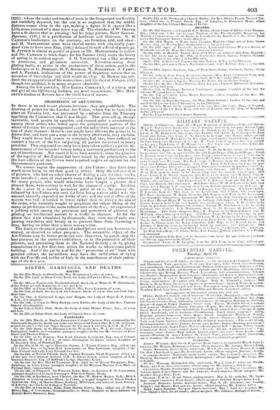PROHIBITION OF ART-UNIONS.
SO there is an end to our picture-lotteries : they are prohibited. The drawing of prizes for the London Art-Union, which was to have taken place on Tuesday last, was prevented by a missive from the Treasury apprizing the Committee that it was illegal. This proceeding, though inevitable, took people by surprise, and created quite a consternation among those artists who relied upon the enlightened patrons of the wheel of fortune for encouragement; and the subscribers murmur at the loss of their chances : Government might have allowed the prizes to he drawn first, and have put a stop to the lottery afterwards, they exclaim. They would have had reason to complain, had they been suffered to commit a breach of the law subjecting all parties concerned to heavy penalties. This step could scarcely have been taken earlier ; a public au- nouncement of the intended lottery being a necessary preliminary to the act of interference. Nor could it have been avoided ; since the question of the legality of Art-Unions had been raised by the printsellers, and the Law-officers of the Crown were required to give an opinion for the Government's guidance. We cannot regret the suppression of Art-Unions : they have done much more harm to art than good to artists. Only the inferior el-,ss of painters, who had no other chance of finding a sale for their marks, were benefited men of real merit were rather inju ed than otherwise ; for many people, who would otherwise have bought a picture that pleased them, were content to wait for the chance of a prize. Looking at the natter in a merely pecuniary point of view, the money dis- tributed by Art-Unions was very far from being a clear addition to the amount annually expended on works of art; and the moral effect of the system was bad: it tended to lower rather than to eleva:e the aim of the artist, who naturally sought to propitiate the vulgar liking of the many in preference to the more refined taste of the few ; end engendered a jobbing spirit among the producers and possessors of pictures, de- grading an intellectual pursuit to a traffic in chances. As for the prints that were circulated by thousands, they were not of such sur- passing excellence and beauty as to prevent them from becoming a drug, having no other than a mere money value.
The fourteen thousand pounds of subscriptions need not, however, be wasted, or diverted to other purposes. The ostensible object of the Art-Unions may be better promoted now than ever, by purchasing the best pictures in the current exhibitions, or in the possession of their painters, and presenting them to the National Gallery ; or by giving commissions to a few first-rate artists for works to adorn some public building. And if the public zeal for the "promotion of art" burn with genuine ardour, the subscribers may have the satisfaction of vying with the Pontiffs and nobles of Italy in the munificence of their patron- age of the fine arts.


























 Previous page
Previous page